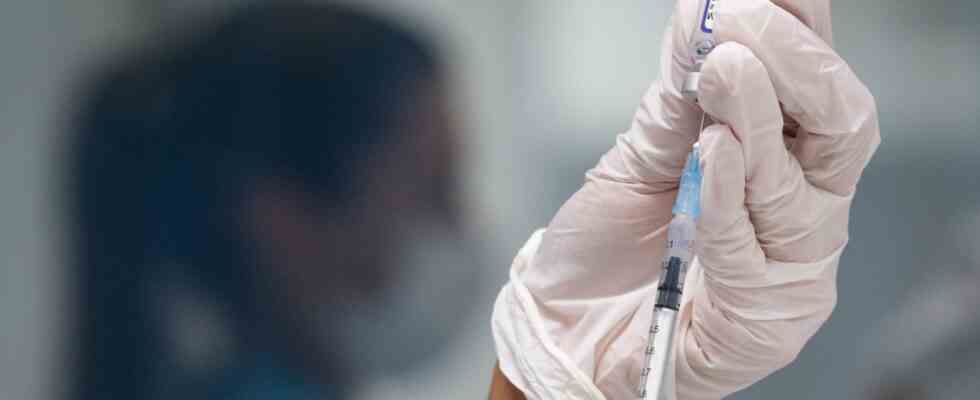Status: 01/18/2023 12:44 p.m
The RSV wave has put a lot of strain on the children’s hospitals. The US company Moderna now wants to apply for approval for an mRNA vaccine against the virus. But this is only intended for older people – for the time being.
RSV: So far, many have only associated this with babies and small children. The respiratory syncytial virus had ensured full children’s hospitals, especially in November and December. Intensive care physicians sounded the alarm because of the sometimes “catastrophic situation” in the children’s intensive care units.
What some do not know: RSV is not only dangerous for premature babies and small children. In the US alone, between 6,000 and 10,000 older adults die from RSV infection each year, and up to 120,000 require clinical treatment, according to the CDC, an agency of the US Department of Health and Human Services.
In Germany, the Robert Koch Institute (RKI) also counts adults with immunodeficiency, an immune system suppressed by medication or previous heart or lung diseases among the risk patients who can become seriously ill with an RSV infection.
What is RSV?
Respiratory syncytial virus is a worldwide pathogen of respiratory infections. Proteins from the envelope of the RS virus can fuse the cells of the lung tissue. This creates giant cells with multiple nuclei called syncytia, which give the virus its name.
RSV vaccine shows clear effect
There is now good news for all of them: in the first half of the year, the US company Moderna wants to apply for approval for an RSV vaccine for adults over 60 years of age in the USA.
The vaccine, named “mRNA-1345,” has shown “promising results” in the phase 3 study required for approval, the company said. According to Moderna, the vaccine reduces the risk of becoming seriously ill with the RS virus by almost 84 percent. About 37,000 people aged 60 and over from 22 countries took part in the study.
Mortality in high-risk children up to 5 percent
But not only older people, but also parents can now hope. Because Moderna is also researching an RSV vaccine for infants and young children. There are other programs for pregnant mothers and a number of other population groups. The company intends to publish the relevant data in the coming months.
A look at the shows how much children are at risk from the RS virus RKI statistics. According to this, only 0.2 percent of cases in children without a known increased risk are fatal on average. In the case of premature babies, however, the rate already rises to 1.2 percent. 4.1 percent of children with the chronic lung disease bronchopulmonary dysplasia and 5.2 percent of children with congenital heart defects die from RSV disease.
Prophylaxis with RSV antibodies possible
There is currently no approved vaccination against RSV worldwide – neither for the elderly nor for small children. However, infants and young children who are particularly at risk can be given antibodies as a preventive measure. These include premature babies or infants with certain heart defects, including children with trisomy 21. The synthetically produced antibodies must be injected monthly during the RSV season, i.e. from November to April.
Recently, the RSV wave in this country had flattened out a bit. But according to that current weekly report of the RKI’s influenza working group the proportion of RSV diagnoses had increased again at the beginning of the year among 0 to 4-year-old children with severe acute respiratory diseases. With 61 percent he was “still very high”.
Companies are also working on cancer vaccination
Should Moderna actually get approval for its RSV vaccine, that would also have to be chalked up as another win for mRNA technology. Because the so-called messenger RNA (English: messenger ribonucleic acid, abbreviated: mRNA), which had already made the Covid 19 vaccines from Moderna and BioNTech/Pfizer a success, is also used in Moderna’s RSV vaccine. The company even uses the same lipid as its Corona vaccine to encapsulate the mRNA.
Originally, mRNA technology was developed to treat cancer. Companies are now making progress here too; just in December, Moderna had presented promising results of a phase 2b study on skin cancer.
Another race between BioNTech and Moderna
As with the corona vaccine, the Americans are also competing with BioNTech in this field. Among the cancer therapies in Mainz, an mRNA vaccine against black skin cancer (melanoma) has so far made the most progress. The study phases for cancer therapies can last up to ten years. But BioNTech boss and founder Ugur Sahin recently told the British broadcaster BBC that he still expects approval “before 2030”.

